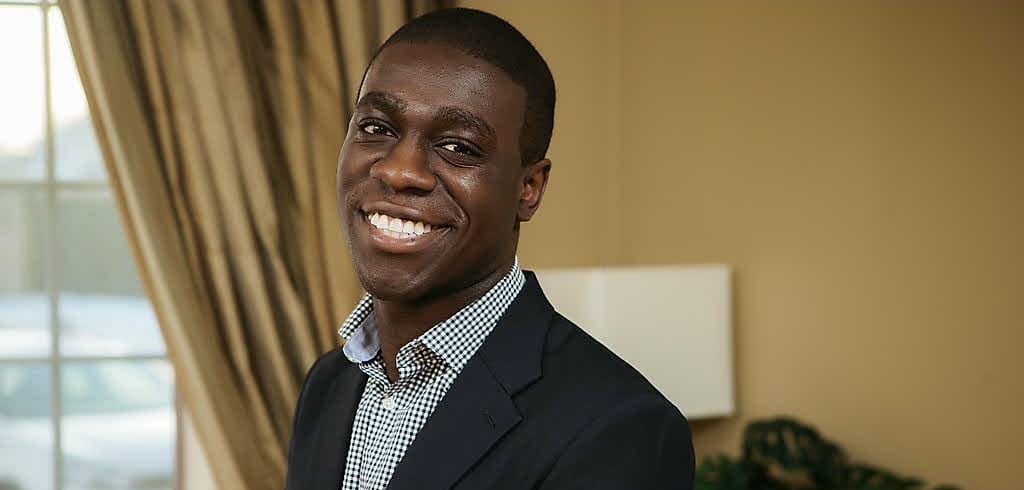“My research is trying to unlock our history and how white supremacy and racism have shaped U.S. foreign policy in Africa, in addition to how Africans themselves have understood their own policies,” said Osei-Opare, an assistant professor of history at Fordham who is originally from Ghana.
A historian who focuses on African and Cold War history, Osei-Opare studies the history of his native Ghana, particularly the Ghanian political economy, Black Marxists, and Africa-Soviet relations. He has written about race and foreign policy in several media outlets, including a recent opinion piece about anti-Black racism in Ukraine for The Washington Post—and in many academic journals.
Two Prestigious Research Positions
Osei-Opare was recently awarded two research positions that will help him to complete his first book, Socialist De-Colony: Soviet & Black Entanglements in Ghana’s Decolonization and Cold War Projects, which will explore Ghana’s relationship with the Cold War. Starting this August, he will begin a two-year research leave from Fordham. During the first year, he will serve as a Mellon Fellow for Assistant Professors at the Institute for Advanced Study’s School of Historical Studies. In the following academic year, he will serve as a scholar-in-residence at the New York Public Library’s Schomburg Center for Research in Black Culture. He plans on returning to teaching at Fordham in August 2024, after he finishes his book, which he called “one of the first history books to examine archival resources from West Africa, Russia, North America, and England.”
An Unusual Perspective on the Cold War
The roots of his research began with his childhood in South Africa. He met two doctors from the former Soviet Union who often mentioned Vladimir Lenin, the founding leader of Soviet Russia, the world’s first communist state, and Osei-Opare grew curious about him. In college, he enrolled in courses that focused on Eastern European history. At the same time, he studied the life of Kwame Nkrumah, the first prime minister and president of Ghana—and eventually, he reached a surprising conclusion.
“Nkrumah’s ideologies sounded very similar to Lenin’s economic policy and Soviet philosophies. I wrote my undergraduate thesis on that, and it just spiraled from there,” said Osei-Opare, who earned a bachelor’s and master’s degree in history from Stanford University and a Ph.D. in history from the University of California, Los Angeles.
Over the past decade, he has continued to study how Ghana sought to refashion its political economy out of colonialism’s extractive model, along with the nation’s relationship with the Soviet Union.
“Now my research has broadened to look at the Cold War in general and Africa’s role in shaping the Cold War. People in the West think of the Cold War as something solely between the U.S. and Soviet Union. But in fact, Africa was one of the big players. I’m trying to push Americans to think about the role that Africans have played in shaping what we know as the Cold War, in addition to the relationship between U.S. foreign policy and race,” he said.
A Shift in Student Understanding of African History
Since he joined Fordham in 2019, Osei-Opare has taught six courses related to his expertise and today’s world, including slavery’s long-lasting impacts and racism in the American educational system.
His course Understanding Historical Change: Africa, which is a requirement for all students, has improved many students’ knowledge of African history, said Osei-Opare.
“Many students come into the class without the best understanding of what Africa is,” he said. “Through this course, I have shown them how the idea of Africa as a wild, barbaric place is pervasive. I show them where these ideas come from, how Africans have fought back against these ideas, and why they still persist.”
In 2020, the United Student Government at Rose Hill awarded him the Beacon Exemplar Award for his excellent work as an educator. In 2022, he also served as the keynote speaker at Fordham’s Diversity Graduation ceremony for Black students.
But for all the recognition he’s received for inspiring students, he says that his students are often the ones who inspire him.
“I’ve come across some wonderful students at Fordham who have helped me think about my research and African history through insightful analysis and questions and whose own research interests have expanded my own expertise,” said Osei-Opare. “They have also challenged me to think about what it means to be a Black male faculty member at a predominantly white instituion higher ed institution and encouraged me to continue to push for an anti-racist institution.”
He recalled some of his most rewarding moments as an educator at Fordham. After the killing of George Floyd and the Black Lives Matter protests in 2020, several students wrote to him, thanking him for helping them to see things differently and discuss issues with a more educated perspective. And at the end of his course UHC: Africa, he said he saw a shift in his students, too.
“Before class began, I asked students to send me three words that come to mind when they think of Africa. At first, they submitted words like ‘dark continent,’ ‘safari,’ and ‘animals.’ At the end of the semester, new words popped up: ‘socialism,’ ‘Pan-Africanism,’ ‘Black consciousness,’ ‘colonialism,’” he said. “There was a shift in seeing Africa as a place where you go and see animals to a place where humans with ideas live and exist.”


